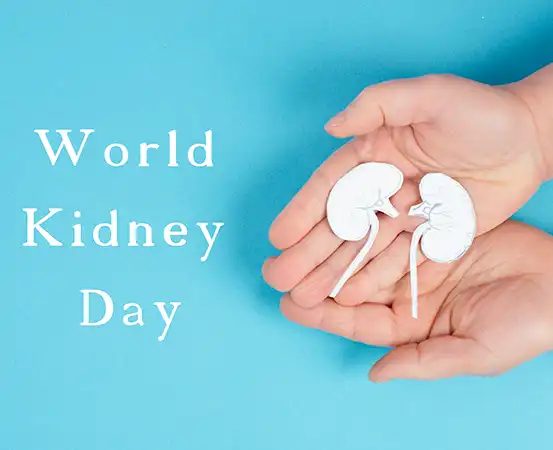
There are various myths about kidney health. On World Kidney Day 2024, Happiest Health organized a webinar on ‘Busting myths about kidney health’.
The two experts — Dr Sundar Sankaran, nephrologist and program director, Aster Institute of Renal Transplantation, and Dr Deepak Kumar Chithralli, senior consultant, nephrologist and transplant physician, Yeshwanthpur, Hebbal Manipal Hospitals, debunk six most common myths about kidney health.
1. Myth: Chronic kidney disease (CKD) is rare and reversible
Fact: The belief that chronic kidney disease is rare is incorrect, clarifies Dr Sankaran.
He adds, “In fact, one of the common causes of chronic kidney disease is diabetes. 30% of all people with diabetes, at some point in time, will get chronic kidney disease. It is common, but it can be detected early and prevented.”
Dr Chithralli adds that contrary to popular belief, chronic kidney disease is not reversible.
He says that kidney diseases are broadly of two types — acute kidney disease and chronic kidney disease. “What is curable is acute kidney disease or acute kidney injury, which develops rapidly due to various reasons such as infections, excessive unsupervised intake of painkillers, or dehydration. These are all reversible conditions. But chronic kidney disease is irreversible,” he says.
Dr Chitralli says that any kidney disease that persists beyond three months is called chronic kidney disease.
2. Myth: Barley water can reverse CKD
Fact: “While papaya is a good fruit for those with kidney disease to add to their diet since it is relatively low on potassium content and barley water is also good for hydration, both cannot cure kidney disease. It can just be an adjuvant in treating kidney disease,” says Dr Sankaran.
3. Myth: If I frequently urinate, this means I have no underlying kidney issues
Fact: Dr Sankaran says that while passing less urine could indicate kidney failure or kidney damage, passing too much urine or urinating very frequently is also a sign of kidney damage that requires investigation.
He adds that people associate underlying kidney disorders with only low urine output and not with frequent urination, unfortunately. “The kidneys filter 200 liters of fluid every day. Routinely, 197 liters are reabsorbed, and about 3 liters of urine are produced. So, when even about 10 percent of that reabsorption mechanism is hampered, you will have 20 liters of urine. So, you pass a lot of urine,” says Dr Sankaran.
“In fact, nocturia, where somebody gets up frequently to urinate, is also a sign of kidney damage,” he adds.
4. Myth: Staying overhydrated will keep kidney disease at bay
Fact: Hydration is essential, not only for kidneys but for the general well-being of all the organs, says Dr Chithralli, adding that for the general population, three to four liters of water intake per day is recommended. However, Dr Chithralli says if someone already has kidney disease, it becomes paramount to restrict their water intake, especially with disease progression.
“The water intake is linked to the urine output. Excess water intake will only get collected in your system, and you can experience swelling in the legs and face, water accumulation in the lungs, breathing issues, and so on,” he says.
Dr Chithralli adds that consuming too little water is also harmful. “It can cause kidney damage, particularly acute kidney injury, because of dehydration. When somebody has a kidney problem, the water intake must be restricted based on the nephrologist’s advice. Each person will have a different recommended water intake based on creatinine levels, medications they’re on, or urine output.”
5. Myth: You need both kidneys to survive
Fact: Dr Sankaran says that only some are born with two kidneys. “One in a thousand is born with only one kidney, and they can lead a normal life. All kidney donors live with one kidney and can lead a healthy living.”
“One of the factors that plays a key role in hesitation and fear towards kidney donation is a popular myth that a person needs two kidneys,” he added. Stressing that kidney donation is safe and that once a kidney is donated or if a kidney is removed, the other kidney will increase in size after a few months to a few years. It compensates for the loss of a kidney.
6. Myth: Dialysis can be done once or twice a month and then stopped
Fact: Dr Chithralli says one cannot skip or discontinue dialysis sessions.
Dialysis is recommended when someone has chronic kidney disease, says Dr Chithralli, adding, “When it progresses to the later stages, what we call it as end-stage renal disease, then the options of renal transplantation or dialysis come into play.”
“Somebody who has already been put on dialysis must continue lifelong if it is labeled as end-stage renal disease. After two or three months of dialysis, if stopped, the symptoms they suffered before starting dialysis will reappear,” he clarifies.
He says that missing dialysis sessions can also cause people to become hospitalized.
Takeaways
Popular myths about kidney health include claims such as CKD can be cured without intervention and it is rare to occur, whereas in reality, CKD has become common, and the solution is either organ transplant or periodic dialysis. No one should go by unscientific claims and discontinue the treatment, say doctors.

















